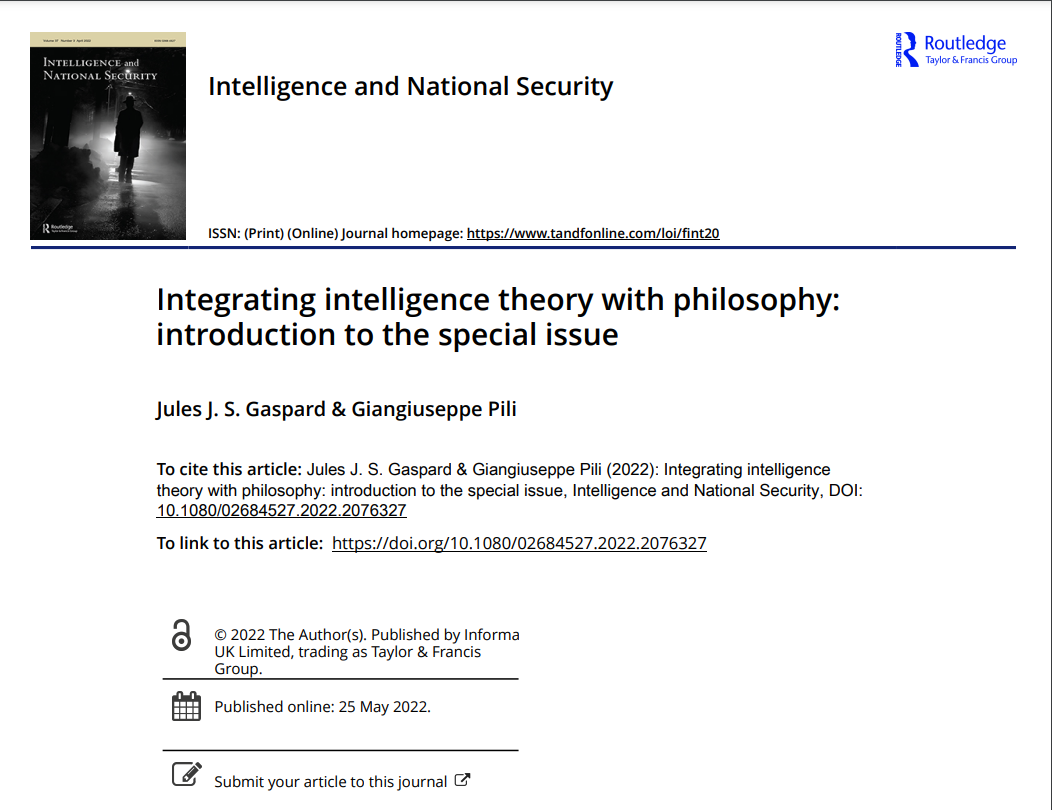Since I started this blog, its motto was “All we need is philosophy… which is love for knowledge”. Naturally, it was a paraphrasis of Beatle’s song “All we need is love”, an over abused mantra. The irony is that the paraphrasis is almost untouched as philosophy was classically defined by Plato as love for knowledge (or wisdom, or whatever it increases human understanding): “all we need is love for knowledge” is what I would have sung if only I was a good songwriter. “All we need is love for knowledge” seems to be a far better and more universal creed, so much so that so great music composers such as the Beatles did not miss it. As it was said in a private conversation by one of the two editors of the esteemed Intelligence and National Security, this special issue was an act of love toward philosophy. As strange it may sound, as unlikely it could be in hour days, when everything is reduced to brutish emotions and useless sarcasm and cynicism, this is the truth.
It is my deep conviction that philosophy will never die, but it has to accept that only from real concrete problems new ideas and approaches can arise. There is too much noise in false technical analyses pushed forward by a self-selected restricted number of individuals who do not represent philosophy, though they are often paying for it. This is not a new phenomenon, and nobody who does know the history of philosophy, and philosophers’ biographers ignore it. This is not an exception, it is the rule. If you look closely at how the human universe works, we should be surprised every single time this is indeed not the case. Philosophy will always outlive human inequalities and struggles, as deep thinking has its own ability to grow and survive. True, many times great ideas survive in spite of the human difficulties, which lasts in human lives, the one that ultimately gives voice to thought. However, it is with this short consideration that I wish the best to the Special Issue edited with my friend and esteemed colleague, Jules J.S. Gaspard. It is the best we managed to do and we do hope that this could be a starting point for a new branch of philosophy itself, the philosophy of intelligence.
ABSTRACT
The purpose of this Special Issue is to integrate intelligence theory within philosophy, an amalgamation absent from prior collective efforts to provide intelligence studies with a complete theoretical dimension. This integration is crucial, as not only is philosophy unavoidable, in its focus on first order knowledge, but in its absence intelligence theory is diminished. The special issue intends to amplify the theoretical endeavour of intelligence studies to the betterment of the exploration of conceptual as well as empirical spaces in intelligence as a field and phenomenon. By integrating intelligence theory into philosophy and creating branch of philosophy concerning itself with the nature and purpose of intelligence, as well as its foundations and implications, the field immediately benefits from that discipline’s rich and expansive diachronic debates, concepts, and skills. As a modern discipline intelligence study did not develop a branch of philosophy as found with more traditional fields (i.e. the philosophy of law,education, science and so on). As such, the discipline rests upon several embedded foundational truisms and assumptions that go uncontested. The integrating of intelligence theory into philosophy will elevate the pursuit of knowledge on intelligence and ensure an ongoing conversation to the enrichment of the study of intelligence.





Be First to Comment